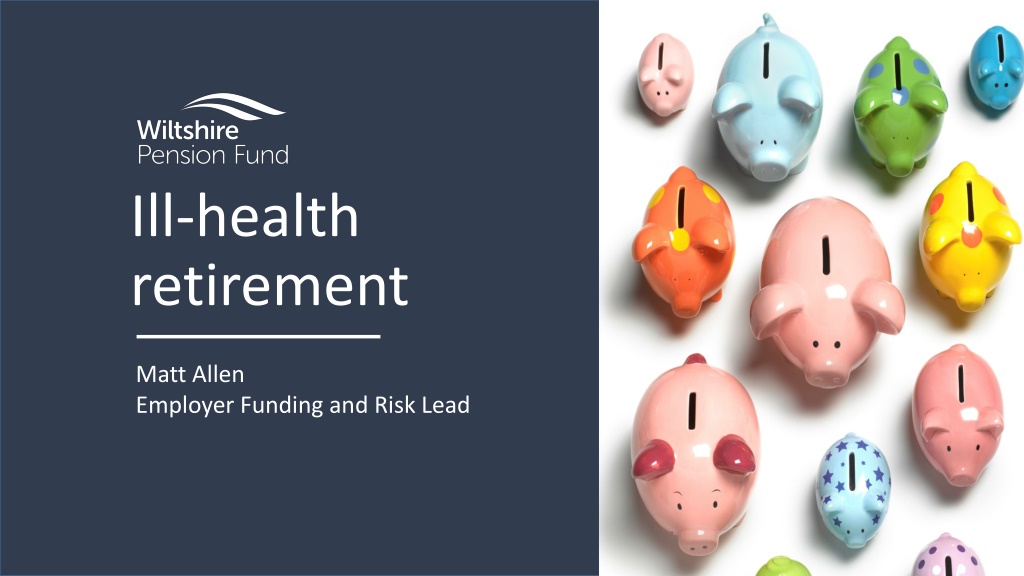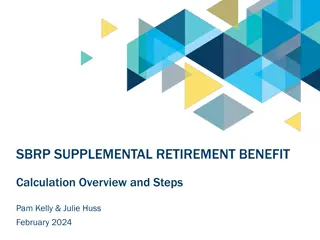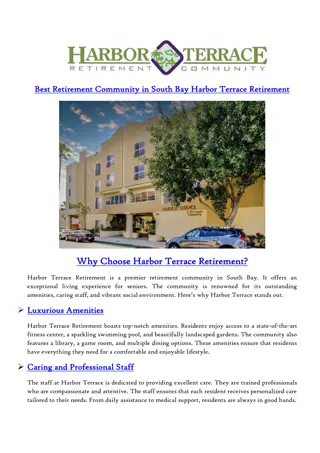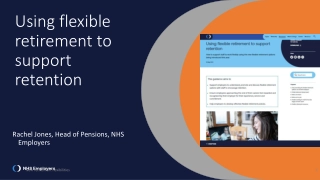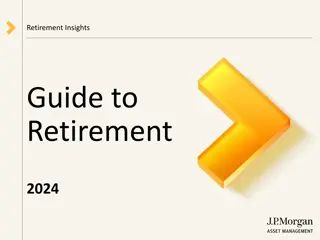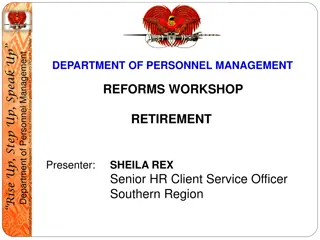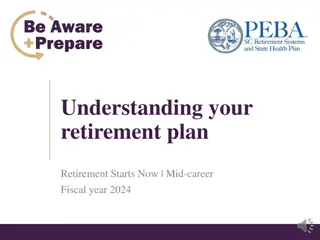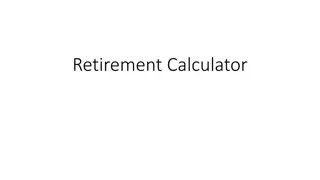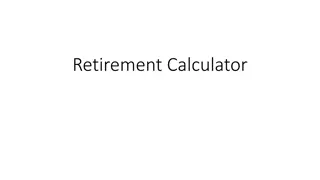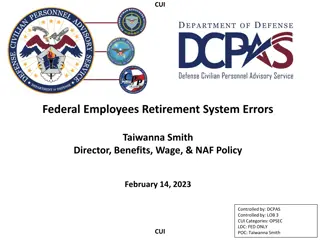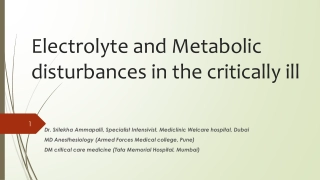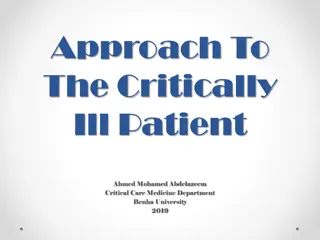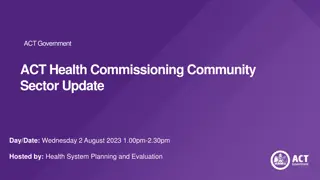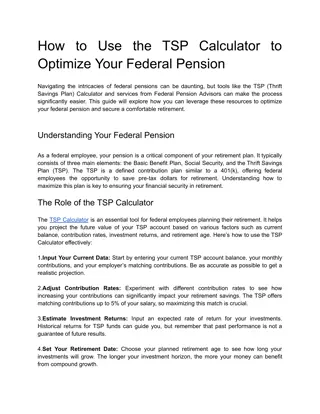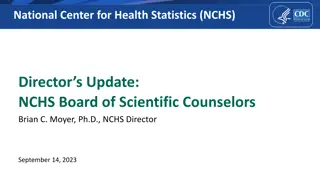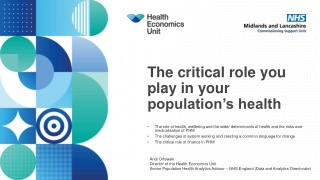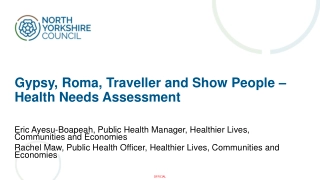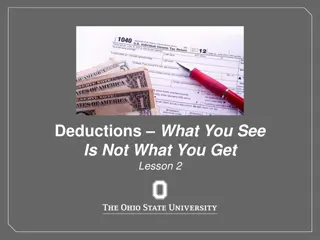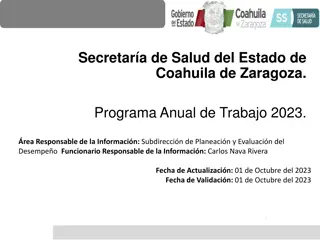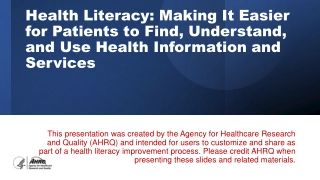Understanding Ill-Health Retirement in LGPS
Ill-health retirement in the Local Government Pension Scheme (LGPS) involves members who are permanently incapable of efficiently performing job duties due to ill-health or infirmity. The process includes a referral to an Independent Registered Medical Practitioner (IRMP) who assesses if the member meets the criteria for ill-health retirement. The decision on ill-health retirement and entitlement to pension benefits is determined by the employer based on the IRMP's certification. Legal regulations outline the steps and criteria for approving early retirement on ill-health grounds.
Understanding Ill-Health Retirement in LGPS
PowerPoint presentation about 'Understanding Ill-Health Retirement in LGPS'. This presentation describes the topic on Ill-health retirement in the Local Government Pension Scheme (LGPS) involves members who are permanently incapable of efficiently performing job duties due to ill-health or infirmity. The process includes a referral to an Independent Registered Medical Practitioner (IRMP) who assesses if the member meets the criteria for ill-health retirement. The decision on ill-health retirement and entitlement to pension benefits is determined by the employer based on the IRMP's certification. Legal regulations outline the steps and criteria for approving early retirement on ill-health grounds.. Download this presentation absolutely free.
Presentation Transcript
Ill-health retirement Matt Allen Employer Funding and Risk Lead
What is ill-health retirement in the LGPS? As a result of ill-health or infirmity of mind or body, permanently incapable of discharging efficiently the duties of the employment the member was engaged in and that the member; As a result of ill-health or infirmity of mind or body, is not immediately capable of undertaking any gainful employment To receive pension benefits for ill-health retirement, the member must have at least 2 years membership (vesting period) Gainful employment Working 30 hours or more a week for a period of 12 months or more
The referral process IRMP opinion
What is an IRMP? The Independent Registered Medical Practitioner (IRMP) is someone who Must be approved by the administering authority Must hold a diploma in occupational health medicine or equivalent Must be an Associate, Member or a Fellow of the Faculty of Occupational Medicine or equivalent Must certify whether, in their opinion, the member meets the relevant criteria for ill health retirement.
Who decides ill health retirement? The Independent Registered Medical Practitioner (IRMP) The Employer
The legal bits LGPS Regulations 2013 Section 36 (1) A decision as to whether a member is entitled under regulation 35 (early payment of retirement pension on ill-health grounds: active members) to early payment of retirement pension on grounds of ill-health or infirmity of mind or body, and if so which tier of benefits the member qualifies for, shall be made by the member s Scheme employer after that authority has obtained a certificate from an IRMP as to (a)whether the member satisfies the conditions in regulation 35(3) and (4); and if so, (b)how long the member is unlikely to be capable of undertaking gainful employment; and (c)where a member has been working reduced hours and had reduced pay as a consequence of the reduction in working hours, whether that member was in part time service wholly or partly as a consequence of ill-health or infirmity of mind or body.
Who decides ill health retirement? The decision to award ill health retirement is known as a first instance decision . Ill health retirement will result in a capital cost, as benefits are being paid earlier than expected. Wiltshire Pension Fund shares these costs across all employers irrespective of size or which organisation awarded the ill health retirement. The Employer Employers cannot take the cost of retirement in account when deciding whether or not to award ill health retirement. Member meets criteria = ill health retirement
What to consider? Is there any conflicting medical evidence? Has the IRMP applied the correct test? Any untried treatments been considered and IRMP explained? Has the IRMP correctly considered permanent incapacity? Has the IRMP correctly considered gainful employment? Ill health certificate fully completed or missing anything? Sufficient information supplied by the IRMP e.g. narrative report or need further clarification? All points considered evidenced?
Ill-health Retirement Tiers The member s pension will be enhanced by adding the amount of pension they would have accrued had they continued in employment until their normal pension age Member is unlikely to be capable of undertaking gainful employment before normal pension age Tier 1 Member is not entitled to Tier 1 benefits and is unlikely to be capable of undertaking any gainful employment within three years of leaving the employment. But is likely to be able to undertake gainful employment before reaching normal pension age The member s ill health pension will be based on their accrued membership, plus 25% of the Tier 1 enhancement described above Tier 2 Member is likely to be capable of undertaking gainful employment within three years of leaving the employment or before normal pension age if earlier, that member is entitled to Tier 3 benefits for so long as the member is not in gainful employment, up to a maximum of three years from the date the member left the employment Benefits built up to date with no enhancement and as if they had reached normal pension age on the date the member s employment was terminated. Eligibility is reviewed after 18 months. Tier 3
Tier 3 A review will need to be undertaken at the point when Tier 3 payments have been made for 18 months. The employer is required to write to the Tier 3 member asking for details of their employment status. If, from the information provided, it is established that gainful employment has been obtained, the Tier 3 payment will be stopped by the Fund and deferred benefits will be award to the member. Alternatively, if no gainful employment has been obtained, a review will need to be completed by an IRMP. Dependent upon the result of the review, it is possible that the member can be: Reassessed to Tier 2 Tier 3 benefits can continue to be paid for the remainder of the 3 years max. period The payment of Tier 3 benefits stop
Who decides tier to award? Wiltshire Pension Fund The Independent Registered Medical Practitioner (IRMP) The Employer
The Notice Letter An employer MUST write to the member, depending on the outcome, the letter should inform: The employer s decision (whether an ill health benefit is to be awarded or not) Inform the member that their decision has been made with reference to the Independent Medical Practitioner's (IRMP) opinion If a benefit has been awarded, the tier of ill health benefit and from what date If a Tier 3 is granted, it must be mentioned that it is a temporary benefit and that there is a review at 18 months If a decision of no award has been made, then the reasons of this decision should be included. Explaining why the member has not met the conditions outlined in the regulations Information on how the member can appeal the decision must also be included i.e. via the Internal Disputes Resolution Procedure (IDRP) process. This should include the timescales for making an appeal and the contact details of the employer s appointed person for appeal
The legal bits LGPS Regulations 2013: Section 80 A scheme employer must - (a) inform the appropriate administering authority of all decisions made by the employer under regulation 72 (first instance decisions) or by an adjudicator appointed by the Scheme employer under regulation 74 (applications for adjudication of disagreements) concerning members; and (b) give that authority such other information as it requires for discharging its Scheme functions.
Information needed by the Fund The employer must provide the following for the Fund to process the ill-health retirement: Copy of IRMP Certificate Copy of notice letter including which tier awarded, the date the benefits are being paid from and the IDRP rights outlined Leaver form including confirmation of the date the benefits are to be paid P45 if available, this should be sent in order for income tax deductions from the pension can be assessed.
Deferred members ill-health retirement 2008 1998 2014 The former employee must be permanently incapable by reason of ill health or infirmity of body or mind of discharging efficiently the duties of their former employment. Must have a reduced likelihood of carrying out any gainful employment before age 65 (or for at least 3 years, whichever is sooner) Must have a reduced likelihood of carrying out any gainful employment before state pension age (or for at least 3 years, whichever is sooner)
Deferred members ill-health retirement 1998 2008 2014 From the date the former employer determines that the ill health criteria has been met From the date the IRMP certifies the former employee met the criteria for payment on health grounds. This can be earlier than the date they applied for their benefits to be paid on health grounds From the date the IRMP certifies the former employee met the criteria for payment on health grounds. This can be earlier than the date they applied for their benefits on health grounds From the date the former employee applied for their benefits to be paid on health grounds
Deferred members ill-health retirement If approved, the member will receive Full payment of deferred benefits No reduction for early payment No enhancement There is no tier system for ill health retirement from deferred status.
The Notice Letter An employer MUST write to the member, depending on the outcome, the letter should inform: The employer s decision (whether an ill health benefit is to be awarded or not) Inform the member that their decision has been made with reference to the Independent Medical Practitioner's (IRMP) opinion If a benefit has been awarded, from what date If a decision of no award has been made, then the reasons of this decision should be included. Explaining why the member has not met the conditions outlined in the regulations Information on how the member can appeal the decision must also be included i.e. via the Internal Disputes Resolution Procedure (IDRP) process. This should include the timescales for making an appeal and the contact details of the employer s appointed person for appeal
Internal Disputes Resolution Procedure (IDRP) A person who is dissatisfied with any decision made by an employer (or the Fund) has the right to have their complaint independently reviewed under IDRP. They must do this within 6 months of the date of the decision that was made that they are disagreeing with. The Pensions Ombudsman Stage 1 Stage 2
Internal Disputes Resolution Procedure (IDRP) At the stage one appeal, the initial decision MUST be reviewed. The adjudicator must respond to the person, in writing, within two months of the appeal. The response must include: A statement of the decision A reference to any legislation relied upon in making their decision A statement that MoneyHelper is available to help the individual A statement that they can take their complaint to the administering authority (stage 2), and the time limit for doing this i.e. up to 6 months from the stage one decision. The employer MUST also provide the administering authority with a copy of the stage one appeal.
Summary Employer considers the opinion of IRMP and makes decision Employer refers member for an IRMP opinion Employer issues the "notice letter" Employer issues information to the Fund
Questions? Matt Allen matthew.allen@wiltshire.gov.uk or 01225 713510 www.wiltshirepensionfund.org.uk
